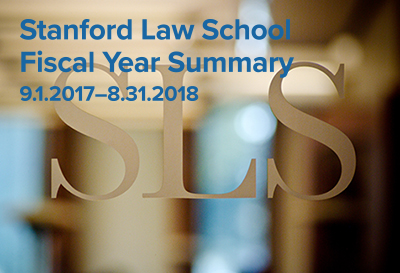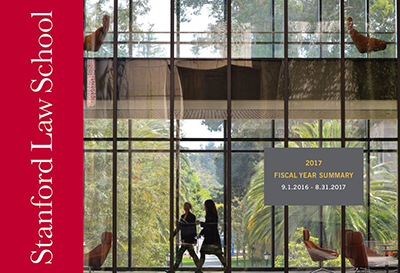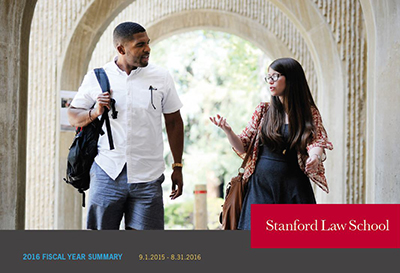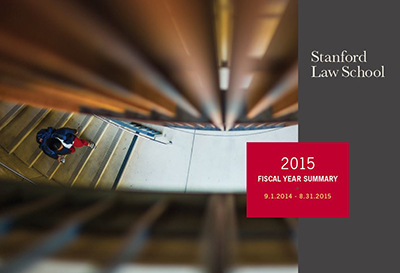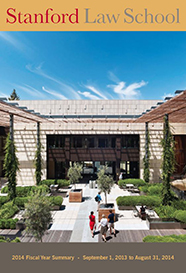
Stanford Law School
2019 Fiscal Year Summary
9.1.2018–8.31.2019

As I reflect on my first months as dean of Stanford Law School, I am filled with so much pride—pride in our talented faculty, bright students, and dedicated alumni. Without the enthusiastic commitment of our community, so much of what we have accomplished would not be possible. SLS remains an innovative and nimble institution at the forefront of a rapidly changing legal landscape because of your enduring philanthropic support. It is with tremendous excitement that I look forward to my first full academic year as dean of this world-class institution—and that’s thanks, in large part, to you.
Jenny S. Martinez, Richard E. Lang Professor of Law and Dean
85%
of the total number of students in the class of 2019 took a clinic
197
alumni benefited from LRAP support this year, which allows them to pursue careers in the public service and public interest law sector by lessening the burden of student loan debt
19
student discussion seminars held in faculty homes on topics including robot ethics, law and religion, and corporate social responsibility
12%
of students in the class of 2019 pursued joint degrees
Financial Overview
The philanthropic support of our community is essential to all that we do at Stanford Law School. From funding our most immediate needs to launching our most innovative programs, your generosity allows our institution to remain a dynamic force in legal education. Thank you.
Sources of Income
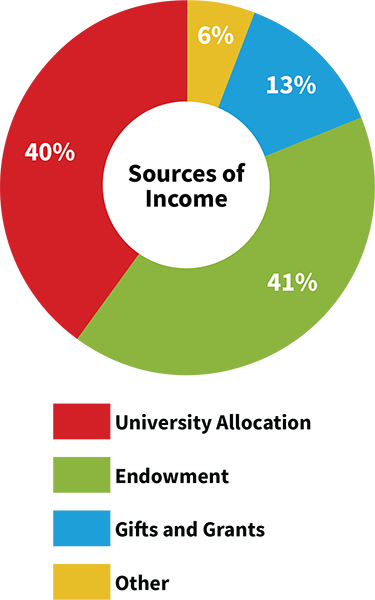
40%
University Allocation
The law school receives tuition, fees, and other general funds from the university.
41%
Endowment
Assets invested in the Stanford University endowment are an enduring source of financial support for the law school and are paid out at a rate of approximately 5.5% annually.
13%
Gifts & Grants
Yearly funding gives SLS the ability to enhance the student experience through developing innovative curricula, recruiting and retaining the best and brightest faculty, and engaging our world-wide alumni community.
6%
Other
Revenue from executive education and conference fees supports the law school’s programs and priorities.
Total Dollars Raised
$46,925,051*
*This figure includes both outright gifts and multi-year pledges committed during fiscal year 2019, including a special $25 million donation to establish the W. A. Franke Global Law Program. “Total Dollars Raised” ($46,925,051) will be more than “Gifts and Grants” ($11,643,559) since the latter only reflects contributions received and used in fiscal year 2019.
Uses of Income
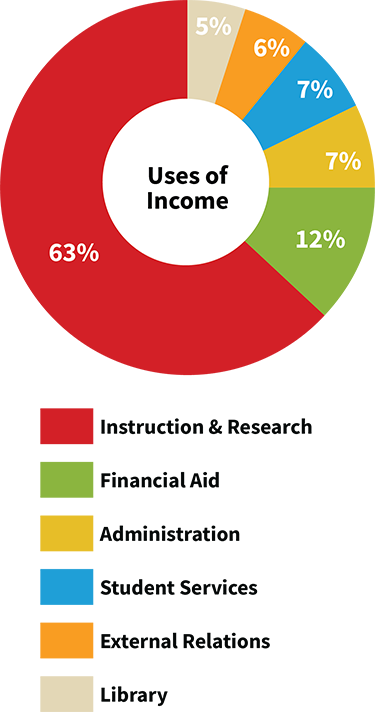
63%
Instruction & Research
Drives innovative research and supports distinguished faculty in the classroom, global program, clinics, and policy lab
12%
Financial Aid
Gives the majority of Stanford Law School students financial assistance and scholarships
7%
Administration
Sustains fundamental operations at SLS, including facilities maintenance, information technology, finance, and human resources
7%
Student Services
Supports the student experience beyond the classroom through programs and services such as the Levin Center for Public Service and Public Interest Law and the Office of Career Services
6%
External Relations
Connects SLS’s global alumni community to current students through communications, events, reunions, volunteer opportunities, and international programs
5%
Library
Maintains essential library services and research resources, including databases, subscriptions, and technology updates
Total Law School Budget
$92,060,827
Advancing the Dynamism of Legal Education
Lan Nguyen, JD ’01
“While it has been 18 years since I graduated from Stanford Law School, my connection to the school remains strong. SLS gave me the skills and opportunity to pursue an intellectually challenging, varied (and sometimes even exciting) career in law. But more than that, I have cherished the lifelong friendships forged with my smart, intellectually curious, and adventurous classmates. To my happy surprise, my relationship to the law school has continued to grow, well after I left Palo Alto, in the form of the SLS network—this wonderful group of colleagues and friends who share a common love and connection to SLS. It is because of all of this that I give back to the law school.”
Adam Sieff, JD ’14
“Through its clinical offerings, interdisciplinary academic program, and outstanding legal teachers, Stanford Law School gave me the tools to put my values into action, the confidence and real-world training I’d need to take risks in my career, as well as the mentors and lifelong friends who will guide me along the way. I have continued to support Stanford Law School—as Co-Chair of the Los Angeles Alumni Chapter, as a reunion volunteer, and financially—because Stanford Law School students are difference-makers who, more often than their peers, pursue unconventional paths to create change. Whatever their mission, the talented young people who file into Crocker Garden for orientation each fall deserve all the support, resources, and encouragement we can muster.”
Laura Castelblanco Engelhardt, JD ’00
“At Stanford Law School, I met more interesting people and made more life-long friends than at any other point in my life. It’s the best learning environment that I could imagine—and I support SLS because I want that to continue.”
Future Lawyers and Leaders
Donovan Hicks, JD ’22
“I feel so humbled that Stanford Law School chose me to join its ranks. With generous scholarship support, I can continue to stay true to my dreams of becoming a civil rights attorney. My generation must answer a bevy of tough questions about race, economic inequality, immigration, technology, and climate change. Stanford lawyers will surely be involved in these fights, if not leading many of them. I cannot thank those of you who support student scholarships enough.”
Leah Kennedy, JD ’22
“I was drawn to Stanford Law School due to its reputation as a place of innovation and creativity and its emphasis on the development of practical skills through full-time clinics. While many law schools profess to support the pursuit of careers in public interest, Stanford is unique due to the Loan Repayment Assistance Program (LRAP) and generous financial aid, individual counseling, and opportunities to develop practical skills. During my time here, I look forward to exploring issues that I care deeply about through pro bono projects like Project Clean Slate and StreetLaw and through the Mills Legal Clinic.”
Philip Issa, JD ’22
“I am already engaged in pro-bono work through the International Refugee Assistance Project and the Stanford Advocates for Immigrant Rights project. I am working with two other students to help a Syrian asylum seeker and his family, presently domiciled in a refugee camp in Jordan, work their way through the appropriate channels to complete their resettlement to the U.S. Earlier this month, I traveled with some of my classmates to Tijuana to help asylum seekers register their claims and prepare for their judicial hearings in the U.S. None of this would be possible without the generosity of Stanford Law School supporters.”
Ground-Breaking Faculty Research
Professor Deborah Rhode
Deborah L. Rhode is the Ernest W. McFarland Professor of Law and the Director of the Center on the Legal Profession. She graduated Phi Beta Kappa and summa cum laude from Yale College and received her JD from Yale Law School. She clerked for United States Supreme Court Justice Thurgood Marshall before joining the Stanford Law School faculty in 1979.
She is the founding chair of the Section on Leadership of the Association of American Law Schools and was the founding president of the International Association of Legal Ethics. In fact, she is the nation’s most frequently cited scholar on legal ethics. She is the author of 30 books in the fields of professional responsibility, leadership, gender, and law and public policy. She has received several awards, including the American Bar Foundation’s W. M. Keck Foundation Award for distinguished scholarship on legal ethics and the White House’s Champion of Change award for a lifetime’s work in increasing access to justice.
Professor Jayashri Srikantiah
Jayashri Srikantiah is the founding director of the law school’s Immigrants’ Rights Clinic. She was named Associate Dean of Clinical Education and Director of the Mills Legal Clinic in the spring of 2019. She has represented scores of immigrants facing removal from the United States, with a focus on representing immigrants with past criminal convictions.
Professor Srikantiah has conducted impact litigation, community outreach, public education, and policy advocacy in partnership with a broad range of immigration nonprofits, on issues ranging from immigration detention to protections for immigrant survivors of domestic violence.
Professor Rob Daines
Robert M. Daines is the Pritzker Professor of Law and Business, Associate Dean for Global Programs, and Senior Faculty for the Rock Center on Corporate Governance at Stanford Law School. He is also Professor of Finance, by courtesy, at the Stanford Graduate School of Business.
His research focuses on the intersection between law and finance, including CEO pay, corporate governance, mergers and acquisitions, mandatory disclosure regulations, IPOs, shareholder voting, and takeover defenses. Professor Daines’ work has appeared in such top publications as the Journal of Financial Economics, the Journal of Financial and Quantitative Analysis, the Journal of Law, Economics and Organization, and The Yale Law Journal.
Unique Experiential Learning Opportunities
The W.A. Franke Global Law Program
At Stanford Law School, we provide our students with the training they need to practice law in an increasingly global world. The W. A. Franke Global Law Program at SLS is unparalleled, offering students the chance to become fully immersed in international law through a 10-week global quarter, combined with rigorous classroom training and intensive overseas study trips.
In the 2018–2019 academic year, students traveled to four different international locations: Thailand, India, South Africa, and The Hague. Classes varied by location, offering students insight into specific legal issues faced by individuals in these international locations. For example, students in the course Human Trafficking: Law and Policy traveled to Thailand where they met with government officials, non-governmental organizations and victims’ organizations, and other actors involved in the anti-trafficking movement. As a result of this field study trip, students came away with a better understanding of the components of the international anti-trafficking ecosystem as well as the complex legal, political, social, and economic factors at work.
The Mills Legal Clinic
The Mills Legal Clinic at Stanford Law School gives students the opportunity to receive hands-on experience doing the real work that lawyers do, while providing critical legal services to underserved individuals and communities. Through engaging in the transformative experience of clinical education at SLS, students gain the tools they need to assess, innovate, and collaborate to solve the pressing problems of our time and become future leaders.
Each of the eleven clinics within the Mills Legal Clinic is directed by faculty members who are not only top lawyers in their fields, but also exceptional educators and mentors. Students work in the clinics full-time for a quarter or more, engaging in an immersive experience that reinforces what they have learned in the classroom.
Priscilla Hernandez, JD ’20, enrolled full-time in the Criminal Defense Clinic in Spring of 2018. In reflecting on her experience, she writes, “Seeing our client’s reaction at the end of the hearing made it all worth it. It reminded me of the incredible difference we as lawyers have the capacity to make, but also showed me the importance of that moment in perfecting the client-centered approach to advocacy. It truly felt like a victory we’d all worked for, and earned together, and it belonged just as much (if not more) to our client’s hard work as to our own.”
Law and Policy Lab
The Law and Policy Lab, unique to Stanford Law School, began six years ago as a new venture in experiential learning. Under the mentorship of expert faculty, students engage in policy practicums for real clients, using analytic approaches that supplement traditional legal analysis. The practicums emphasize teamwork and collaboration, and many are interdisciplinary, giving law students the opportunity to work with faculty and colleagues from across the university with expertise in such fields as technology, environmental engineering, medicine, and international diplomacy, among others.
In fact, in the 2018–2019 academic year, law students and engineering students enrolled in the policy practicum, Administering by Algorithm: Artificial Intelligence in the Regulatory State. Students in this policy lab explored the growing role that artificial intelligence (AI) and related technologies play in the federal administrative state. At the culmination of the practicum, students submitted a first-of-its-kind report to the Administrative Conference of the United States, canvassing the hundreds of agencies that make up the federal administrative state and documenting agency use of AI across a wide range of substantive policy areas.
The Law Fund
The Educational Experience
The Law Fund provides support to
- faculty teaching, research, and course development, all of which are core to advancing knowledge and training future leaders and decision makers on the special role and responsibility they have to serve the public good;
- create opportunities for curricular innovation and experiential learning, including the diverse array of clinics and policy labs, which enable students to have immersive, hands-on experiences, applying what they learn in the classroom to real legal work;
- enable deep and broad experiences beyond direct coursework, including student organizations, journals, and the Stanford Law Review.
Student Support
The Law Fund provides funding for
- financial aid, enabling SLS to attract the best and brightest students;
- the Loan Repayment Assistance Program, which helps recent graduates pursuing careers in the public interest;
- research services and media in the Robert Crown Law Library, and the support of the Office of Career Services.
Alumni Engagement
The Law Fund promotes
- connections between and among alumni, students, and the school, broadening and deepening ties within our community.

